HA3021 Corporations Law: Director's Duties in AWA Ltd v Daniels
VerifiedAdded on 2023/06/11
|10
|2643
|384
Case Study
AI Summary
This case study provides an in-depth analysis of the AWA Limited v Daniels (1992) case, a landmark decision in Australian corporate law concerning director's duties. The case involved a suit by AWA against its auditors for losses incurred due to foreign exchange dealings, with a cross-claim by the auditors against the directors for negligence. The report outlines the facts of the case, including the unauthorized foreign exchange activities and the failure of both the auditors and the directors to adequately address internal control deficiencies. It identifies breaches of duties under the Corporations Act, particularly the duty of care and diligence required of directors. The analysis delves into the court's decision, highlighting the evolving standards of care expected of directors and the importance of active participation in overseeing company operations and financial affairs. The study concludes that the AWA Limited v Daniels case remains relevant as it underscores the necessity for directors to be informed, proactive, and diligent in fulfilling their responsibilities to the corporation. Desklib provides access to similar case studies and solved assignments for students.
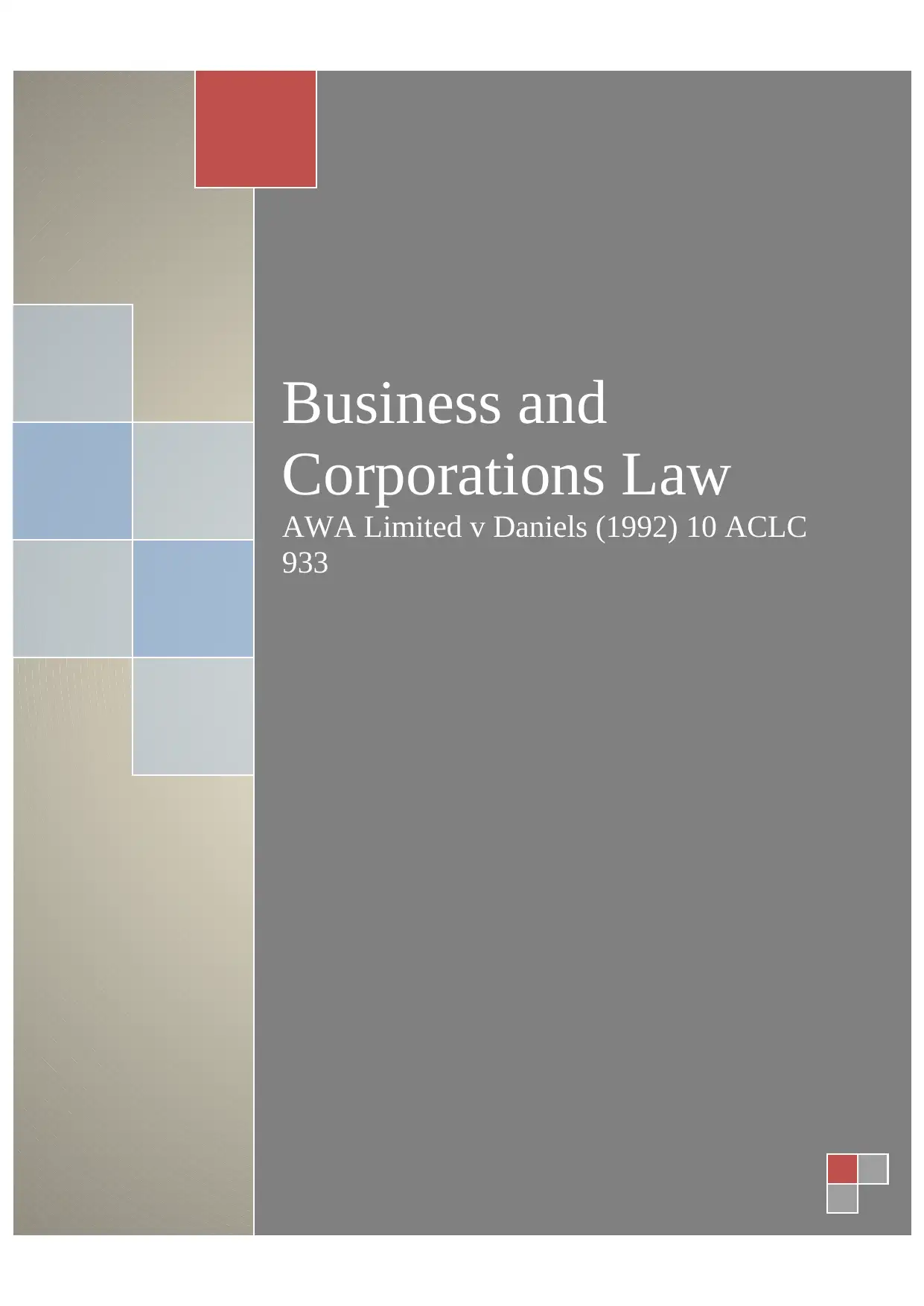
Business and
Corporations Law
AWA Limited v Daniels (1992) 10 ACLC
933
Corporations Law
AWA Limited v Daniels (1992) 10 ACLC
933
Paraphrase This Document
Need a fresh take? Get an instant paraphrase of this document with our AI Paraphraser
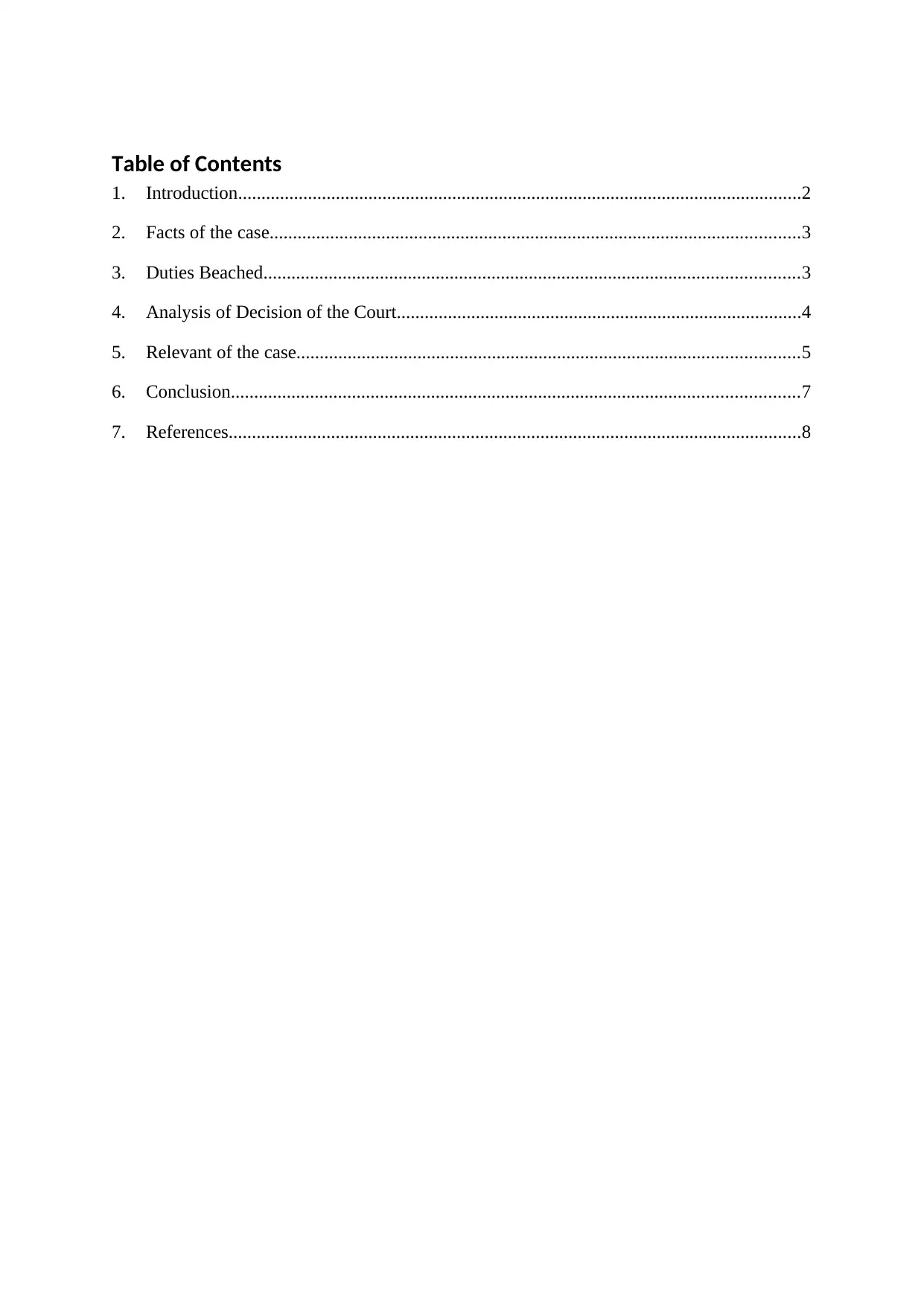
Table of Contents
1. Introduction.........................................................................................................................2
2. Facts of the case..................................................................................................................3
3. Duties Beached...................................................................................................................3
4. Analysis of Decision of the Court.......................................................................................4
5. Relevant of the case............................................................................................................5
6. Conclusion..........................................................................................................................7
7. References...........................................................................................................................8
1. Introduction.........................................................................................................................2
2. Facts of the case..................................................................................................................3
3. Duties Beached...................................................................................................................3
4. Analysis of Decision of the Court.......................................................................................4
5. Relevant of the case............................................................................................................5
6. Conclusion..........................................................................................................................7
7. References...........................................................................................................................8
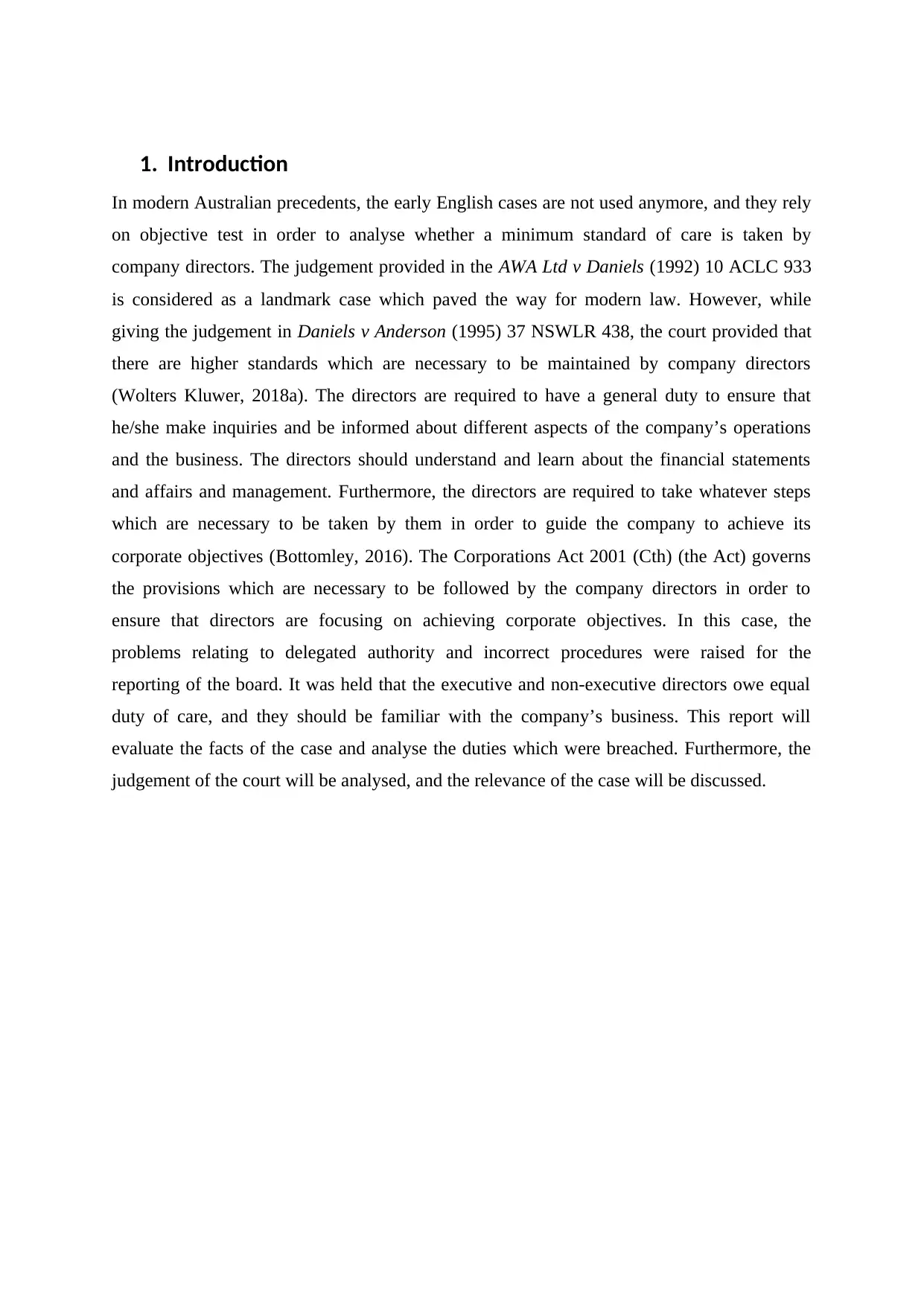
1. Introduction
In modern Australian precedents, the early English cases are not used anymore, and they rely
on objective test in order to analyse whether a minimum standard of care is taken by
company directors. The judgement provided in the AWA Ltd v Daniels (1992) 10 ACLC 933
is considered as a landmark case which paved the way for modern law. However, while
giving the judgement in Daniels v Anderson (1995) 37 NSWLR 438, the court provided that
there are higher standards which are necessary to be maintained by company directors
(Wolters Kluwer, 2018a). The directors are required to have a general duty to ensure that
he/she make inquiries and be informed about different aspects of the company’s operations
and the business. The directors should understand and learn about the financial statements
and affairs and management. Furthermore, the directors are required to take whatever steps
which are necessary to be taken by them in order to guide the company to achieve its
corporate objectives (Bottomley, 2016). The Corporations Act 2001 (Cth) (the Act) governs
the provisions which are necessary to be followed by the company directors in order to
ensure that directors are focusing on achieving corporate objectives. In this case, the
problems relating to delegated authority and incorrect procedures were raised for the
reporting of the board. It was held that the executive and non-executive directors owe equal
duty of care, and they should be familiar with the company’s business. This report will
evaluate the facts of the case and analyse the duties which were breached. Furthermore, the
judgement of the court will be analysed, and the relevance of the case will be discussed.
In modern Australian precedents, the early English cases are not used anymore, and they rely
on objective test in order to analyse whether a minimum standard of care is taken by
company directors. The judgement provided in the AWA Ltd v Daniels (1992) 10 ACLC 933
is considered as a landmark case which paved the way for modern law. However, while
giving the judgement in Daniels v Anderson (1995) 37 NSWLR 438, the court provided that
there are higher standards which are necessary to be maintained by company directors
(Wolters Kluwer, 2018a). The directors are required to have a general duty to ensure that
he/she make inquiries and be informed about different aspects of the company’s operations
and the business. The directors should understand and learn about the financial statements
and affairs and management. Furthermore, the directors are required to take whatever steps
which are necessary to be taken by them in order to guide the company to achieve its
corporate objectives (Bottomley, 2016). The Corporations Act 2001 (Cth) (the Act) governs
the provisions which are necessary to be followed by the company directors in order to
ensure that directors are focusing on achieving corporate objectives. In this case, the
problems relating to delegated authority and incorrect procedures were raised for the
reporting of the board. It was held that the executive and non-executive directors owe equal
duty of care, and they should be familiar with the company’s business. This report will
evaluate the facts of the case and analyse the duties which were breached. Furthermore, the
judgement of the court will be analysed, and the relevance of the case will be discussed.
⊘ This is a preview!⊘
Do you want full access?
Subscribe today to unlock all pages.

Trusted by 1+ million students worldwide
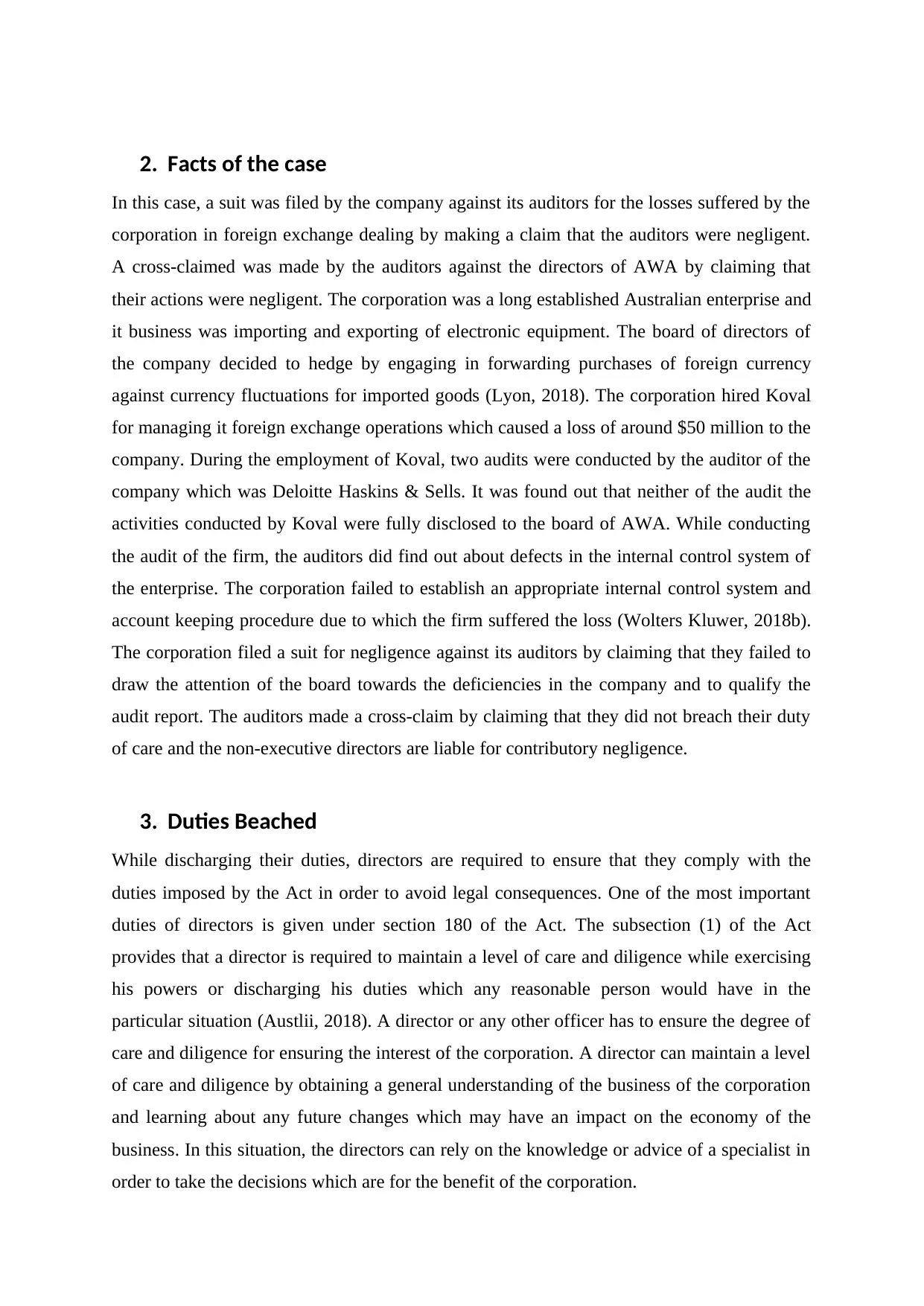
2. Facts of the case
In this case, a suit was filed by the company against its auditors for the losses suffered by the
corporation in foreign exchange dealing by making a claim that the auditors were negligent.
A cross-claimed was made by the auditors against the directors of AWA by claiming that
their actions were negligent. The corporation was a long established Australian enterprise and
it business was importing and exporting of electronic equipment. The board of directors of
the company decided to hedge by engaging in forwarding purchases of foreign currency
against currency fluctuations for imported goods (Lyon, 2018). The corporation hired Koval
for managing it foreign exchange operations which caused a loss of around $50 million to the
company. During the employment of Koval, two audits were conducted by the auditor of the
company which was Deloitte Haskins & Sells. It was found out that neither of the audit the
activities conducted by Koval were fully disclosed to the board of AWA. While conducting
the audit of the firm, the auditors did find out about defects in the internal control system of
the enterprise. The corporation failed to establish an appropriate internal control system and
account keeping procedure due to which the firm suffered the loss (Wolters Kluwer, 2018b).
The corporation filed a suit for negligence against its auditors by claiming that they failed to
draw the attention of the board towards the deficiencies in the company and to qualify the
audit report. The auditors made a cross-claim by claiming that they did not breach their duty
of care and the non-executive directors are liable for contributory negligence.
3. Duties Beached
While discharging their duties, directors are required to ensure that they comply with the
duties imposed by the Act in order to avoid legal consequences. One of the most important
duties of directors is given under section 180 of the Act. The subsection (1) of the Act
provides that a director is required to maintain a level of care and diligence while exercising
his powers or discharging his duties which any reasonable person would have in the
particular situation (Austlii, 2018). A director or any other officer has to ensure the degree of
care and diligence for ensuring the interest of the corporation. A director can maintain a level
of care and diligence by obtaining a general understanding of the business of the corporation
and learning about any future changes which may have an impact on the economy of the
business. In this situation, the directors can rely on the knowledge or advice of a specialist in
order to take the decisions which are for the benefit of the corporation.
In this case, a suit was filed by the company against its auditors for the losses suffered by the
corporation in foreign exchange dealing by making a claim that the auditors were negligent.
A cross-claimed was made by the auditors against the directors of AWA by claiming that
their actions were negligent. The corporation was a long established Australian enterprise and
it business was importing and exporting of electronic equipment. The board of directors of
the company decided to hedge by engaging in forwarding purchases of foreign currency
against currency fluctuations for imported goods (Lyon, 2018). The corporation hired Koval
for managing it foreign exchange operations which caused a loss of around $50 million to the
company. During the employment of Koval, two audits were conducted by the auditor of the
company which was Deloitte Haskins & Sells. It was found out that neither of the audit the
activities conducted by Koval were fully disclosed to the board of AWA. While conducting
the audit of the firm, the auditors did find out about defects in the internal control system of
the enterprise. The corporation failed to establish an appropriate internal control system and
account keeping procedure due to which the firm suffered the loss (Wolters Kluwer, 2018b).
The corporation filed a suit for negligence against its auditors by claiming that they failed to
draw the attention of the board towards the deficiencies in the company and to qualify the
audit report. The auditors made a cross-claim by claiming that they did not breach their duty
of care and the non-executive directors are liable for contributory negligence.
3. Duties Beached
While discharging their duties, directors are required to ensure that they comply with the
duties imposed by the Act in order to avoid legal consequences. One of the most important
duties of directors is given under section 180 of the Act. The subsection (1) of the Act
provides that a director is required to maintain a level of care and diligence while exercising
his powers or discharging his duties which any reasonable person would have in the
particular situation (Austlii, 2018). A director or any other officer has to ensure the degree of
care and diligence for ensuring the interest of the corporation. A director can maintain a level
of care and diligence by obtaining a general understanding of the business of the corporation
and learning about any future changes which may have an impact on the economy of the
business. In this situation, the directors can rely on the knowledge or advice of a specialist in
order to take the decisions which are for the benefit of the corporation.
Paraphrase This Document
Need a fresh take? Get an instant paraphrase of this document with our AI Paraphraser
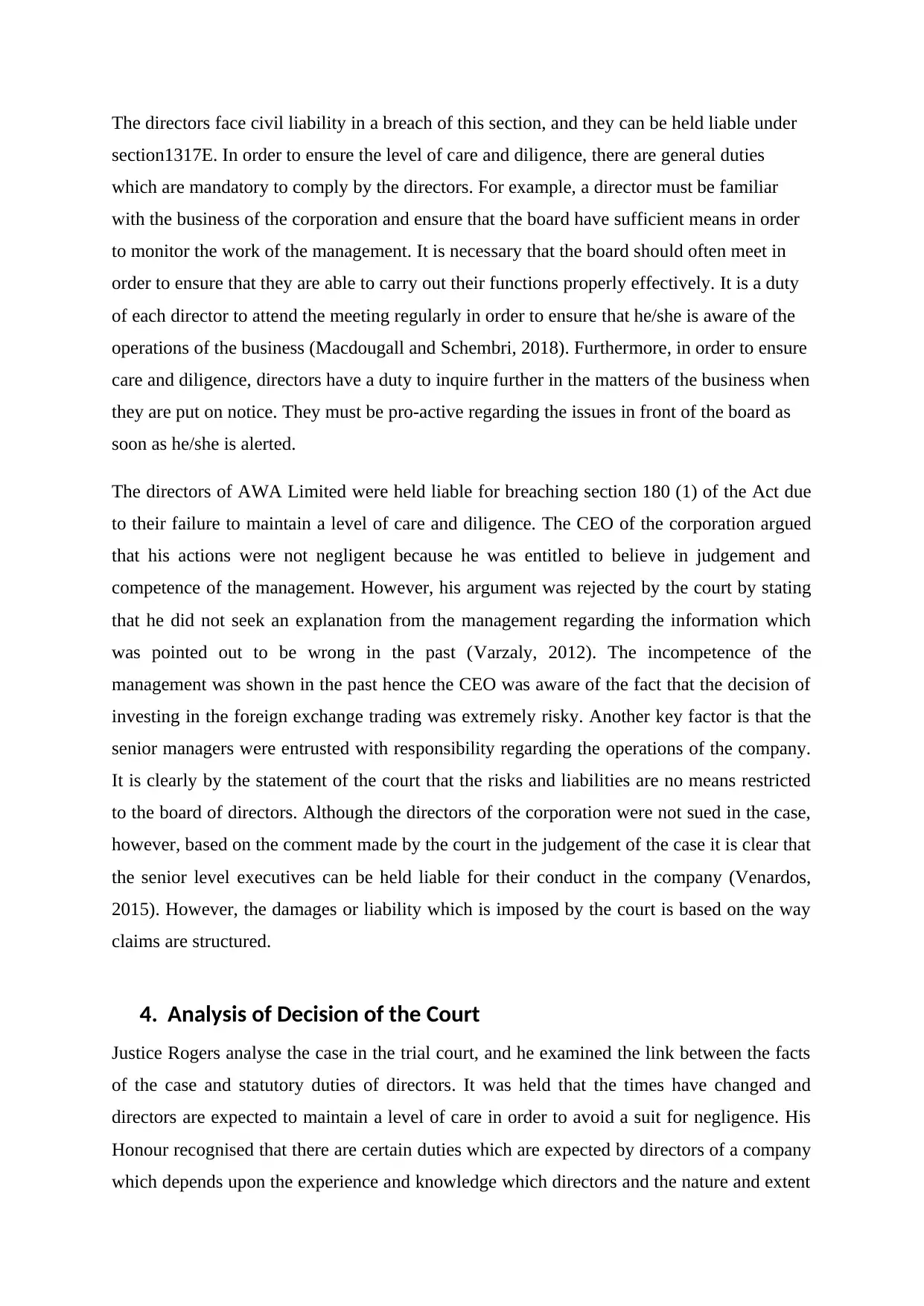
The directors face civil liability in a breach of this section, and they can be held liable under
section1317E. In order to ensure the level of care and diligence, there are general duties
which are mandatory to comply by the directors. For example, a director must be familiar
with the business of the corporation and ensure that the board have sufficient means in order
to monitor the work of the management. It is necessary that the board should often meet in
order to ensure that they are able to carry out their functions properly effectively. It is a duty
of each director to attend the meeting regularly in order to ensure that he/she is aware of the
operations of the business (Macdougall and Schembri, 2018). Furthermore, in order to ensure
care and diligence, directors have a duty to inquire further in the matters of the business when
they are put on notice. They must be pro-active regarding the issues in front of the board as
soon as he/she is alerted.
The directors of AWA Limited were held liable for breaching section 180 (1) of the Act due
to their failure to maintain a level of care and diligence. The CEO of the corporation argued
that his actions were not negligent because he was entitled to believe in judgement and
competence of the management. However, his argument was rejected by the court by stating
that he did not seek an explanation from the management regarding the information which
was pointed out to be wrong in the past (Varzaly, 2012). The incompetence of the
management was shown in the past hence the CEO was aware of the fact that the decision of
investing in the foreign exchange trading was extremely risky. Another key factor is that the
senior managers were entrusted with responsibility regarding the operations of the company.
It is clearly by the statement of the court that the risks and liabilities are no means restricted
to the board of directors. Although the directors of the corporation were not sued in the case,
however, based on the comment made by the court in the judgement of the case it is clear that
the senior level executives can be held liable for their conduct in the company (Venardos,
2015). However, the damages or liability which is imposed by the court is based on the way
claims are structured.
4. Analysis of Decision of the Court
Justice Rogers analyse the case in the trial court, and he examined the link between the facts
of the case and statutory duties of directors. It was held that the times have changed and
directors are expected to maintain a level of care in order to avoid a suit for negligence. His
Honour recognised that there are certain duties which are expected by directors of a company
which depends upon the experience and knowledge which directors and the nature and extent
section1317E. In order to ensure the level of care and diligence, there are general duties
which are mandatory to comply by the directors. For example, a director must be familiar
with the business of the corporation and ensure that the board have sufficient means in order
to monitor the work of the management. It is necessary that the board should often meet in
order to ensure that they are able to carry out their functions properly effectively. It is a duty
of each director to attend the meeting regularly in order to ensure that he/she is aware of the
operations of the business (Macdougall and Schembri, 2018). Furthermore, in order to ensure
care and diligence, directors have a duty to inquire further in the matters of the business when
they are put on notice. They must be pro-active regarding the issues in front of the board as
soon as he/she is alerted.
The directors of AWA Limited were held liable for breaching section 180 (1) of the Act due
to their failure to maintain a level of care and diligence. The CEO of the corporation argued
that his actions were not negligent because he was entitled to believe in judgement and
competence of the management. However, his argument was rejected by the court by stating
that he did not seek an explanation from the management regarding the information which
was pointed out to be wrong in the past (Varzaly, 2012). The incompetence of the
management was shown in the past hence the CEO was aware of the fact that the decision of
investing in the foreign exchange trading was extremely risky. Another key factor is that the
senior managers were entrusted with responsibility regarding the operations of the company.
It is clearly by the statement of the court that the risks and liabilities are no means restricted
to the board of directors. Although the directors of the corporation were not sued in the case,
however, based on the comment made by the court in the judgement of the case it is clear that
the senior level executives can be held liable for their conduct in the company (Venardos,
2015). However, the damages or liability which is imposed by the court is based on the way
claims are structured.
4. Analysis of Decision of the Court
Justice Rogers analyse the case in the trial court, and he examined the link between the facts
of the case and statutory duties of directors. It was held that the times have changed and
directors are expected to maintain a level of care in order to avoid a suit for negligence. His
Honour recognised that there are certain duties which are expected by directors of a company
which depends upon the experience and knowledge which directors and the nature and extent
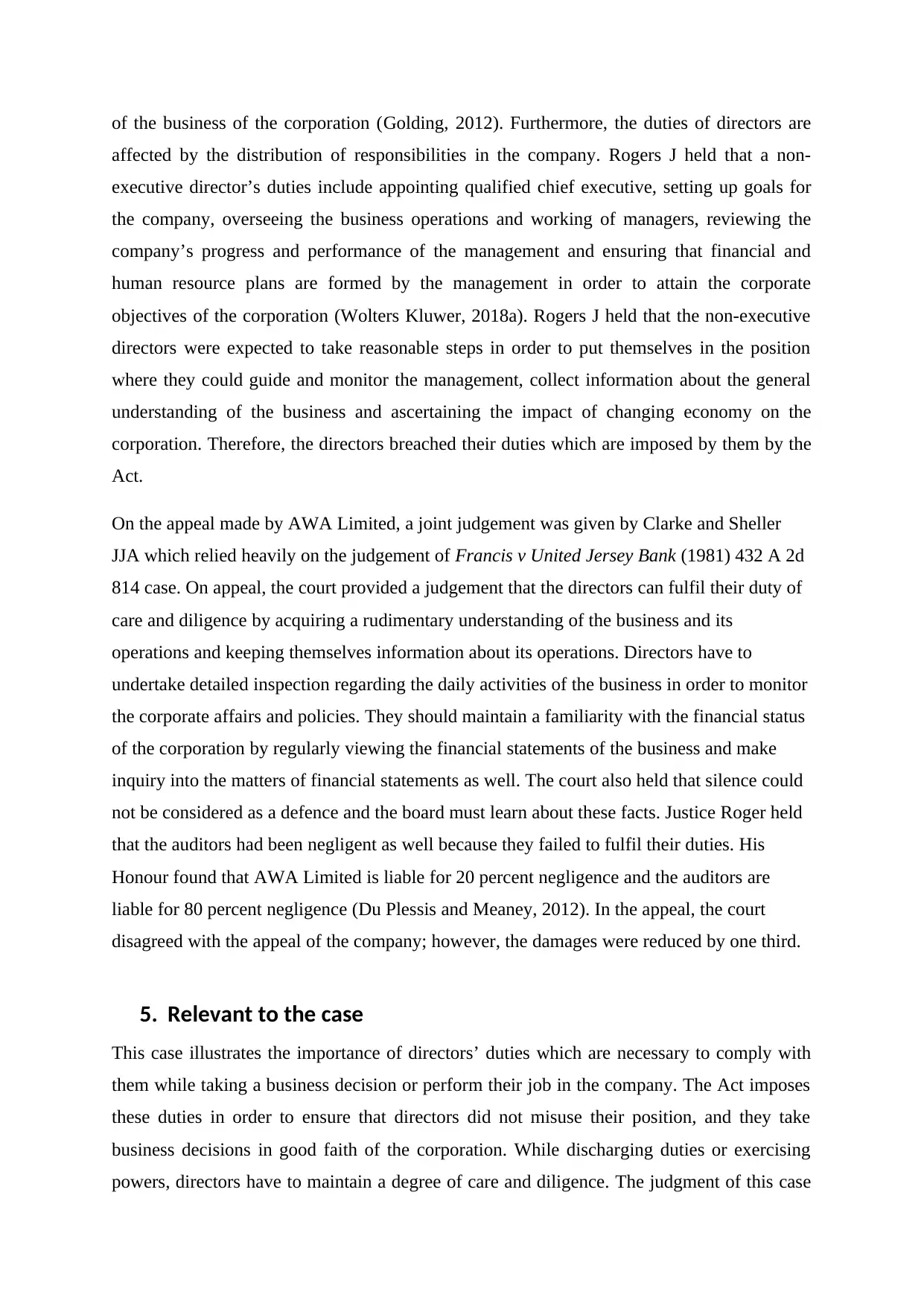
of the business of the corporation (Golding, 2012). Furthermore, the duties of directors are
affected by the distribution of responsibilities in the company. Rogers J held that a non-
executive director’s duties include appointing qualified chief executive, setting up goals for
the company, overseeing the business operations and working of managers, reviewing the
company’s progress and performance of the management and ensuring that financial and
human resource plans are formed by the management in order to attain the corporate
objectives of the corporation (Wolters Kluwer, 2018a). Rogers J held that the non-executive
directors were expected to take reasonable steps in order to put themselves in the position
where they could guide and monitor the management, collect information about the general
understanding of the business and ascertaining the impact of changing economy on the
corporation. Therefore, the directors breached their duties which are imposed by them by the
Act.
On the appeal made by AWA Limited, a joint judgement was given by Clarke and Sheller
JJA which relied heavily on the judgement of Francis v United Jersey Bank (1981) 432 A 2d
814 case. On appeal, the court provided a judgement that the directors can fulfil their duty of
care and diligence by acquiring a rudimentary understanding of the business and its
operations and keeping themselves information about its operations. Directors have to
undertake detailed inspection regarding the daily activities of the business in order to monitor
the corporate affairs and policies. They should maintain a familiarity with the financial status
of the corporation by regularly viewing the financial statements of the business and make
inquiry into the matters of financial statements as well. The court also held that silence could
not be considered as a defence and the board must learn about these facts. Justice Roger held
that the auditors had been negligent as well because they failed to fulfil their duties. His
Honour found that AWA Limited is liable for 20 percent negligence and the auditors are
liable for 80 percent negligence (Du Plessis and Meaney, 2012). In the appeal, the court
disagreed with the appeal of the company; however, the damages were reduced by one third.
5. Relevant to the case
This case illustrates the importance of directors’ duties which are necessary to comply with
them while taking a business decision or perform their job in the company. The Act imposes
these duties in order to ensure that directors did not misuse their position, and they take
business decisions in good faith of the corporation. While discharging duties or exercising
powers, directors have to maintain a degree of care and diligence. The judgment of this case
affected by the distribution of responsibilities in the company. Rogers J held that a non-
executive director’s duties include appointing qualified chief executive, setting up goals for
the company, overseeing the business operations and working of managers, reviewing the
company’s progress and performance of the management and ensuring that financial and
human resource plans are formed by the management in order to attain the corporate
objectives of the corporation (Wolters Kluwer, 2018a). Rogers J held that the non-executive
directors were expected to take reasonable steps in order to put themselves in the position
where they could guide and monitor the management, collect information about the general
understanding of the business and ascertaining the impact of changing economy on the
corporation. Therefore, the directors breached their duties which are imposed by them by the
Act.
On the appeal made by AWA Limited, a joint judgement was given by Clarke and Sheller
JJA which relied heavily on the judgement of Francis v United Jersey Bank (1981) 432 A 2d
814 case. On appeal, the court provided a judgement that the directors can fulfil their duty of
care and diligence by acquiring a rudimentary understanding of the business and its
operations and keeping themselves information about its operations. Directors have to
undertake detailed inspection regarding the daily activities of the business in order to monitor
the corporate affairs and policies. They should maintain a familiarity with the financial status
of the corporation by regularly viewing the financial statements of the business and make
inquiry into the matters of financial statements as well. The court also held that silence could
not be considered as a defence and the board must learn about these facts. Justice Roger held
that the auditors had been negligent as well because they failed to fulfil their duties. His
Honour found that AWA Limited is liable for 20 percent negligence and the auditors are
liable for 80 percent negligence (Du Plessis and Meaney, 2012). In the appeal, the court
disagreed with the appeal of the company; however, the damages were reduced by one third.
5. Relevant to the case
This case illustrates the importance of directors’ duties which are necessary to comply with
them while taking a business decision or perform their job in the company. The Act imposes
these duties in order to ensure that directors did not misuse their position, and they take
business decisions in good faith of the corporation. While discharging duties or exercising
powers, directors have to maintain a degree of care and diligence. The judgment of this case
⊘ This is a preview!⊘
Do you want full access?
Subscribe today to unlock all pages.

Trusted by 1+ million students worldwide
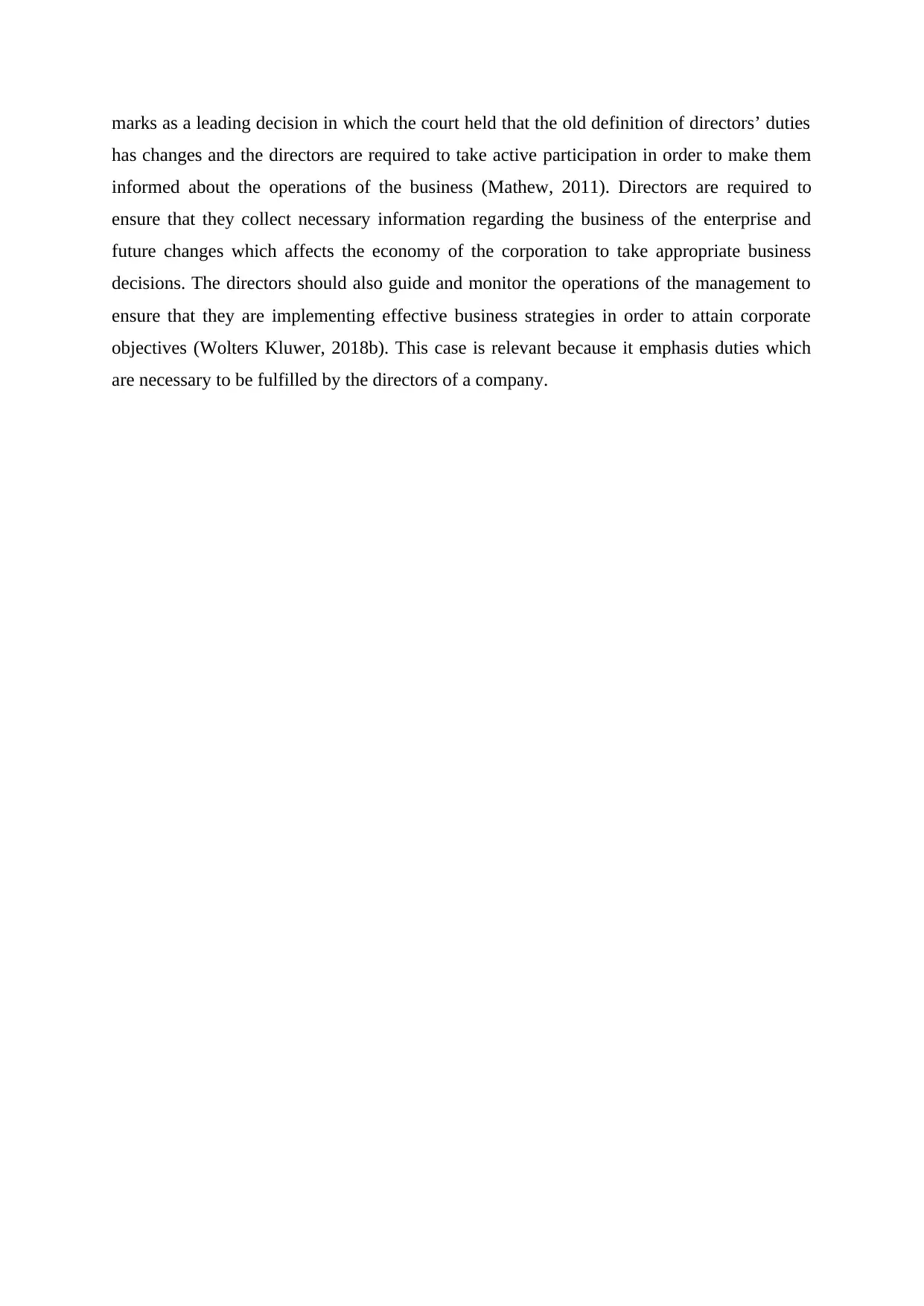
marks as a leading decision in which the court held that the old definition of directors’ duties
has changes and the directors are required to take active participation in order to make them
informed about the operations of the business (Mathew, 2011). Directors are required to
ensure that they collect necessary information regarding the business of the enterprise and
future changes which affects the economy of the corporation to take appropriate business
decisions. The directors should also guide and monitor the operations of the management to
ensure that they are implementing effective business strategies in order to attain corporate
objectives (Wolters Kluwer, 2018b). This case is relevant because it emphasis duties which
are necessary to be fulfilled by the directors of a company.
has changes and the directors are required to take active participation in order to make them
informed about the operations of the business (Mathew, 2011). Directors are required to
ensure that they collect necessary information regarding the business of the enterprise and
future changes which affects the economy of the corporation to take appropriate business
decisions. The directors should also guide and monitor the operations of the management to
ensure that they are implementing effective business strategies in order to attain corporate
objectives (Wolters Kluwer, 2018b). This case is relevant because it emphasis duties which
are necessary to be fulfilled by the directors of a company.
Paraphrase This Document
Need a fresh take? Get an instant paraphrase of this document with our AI Paraphraser
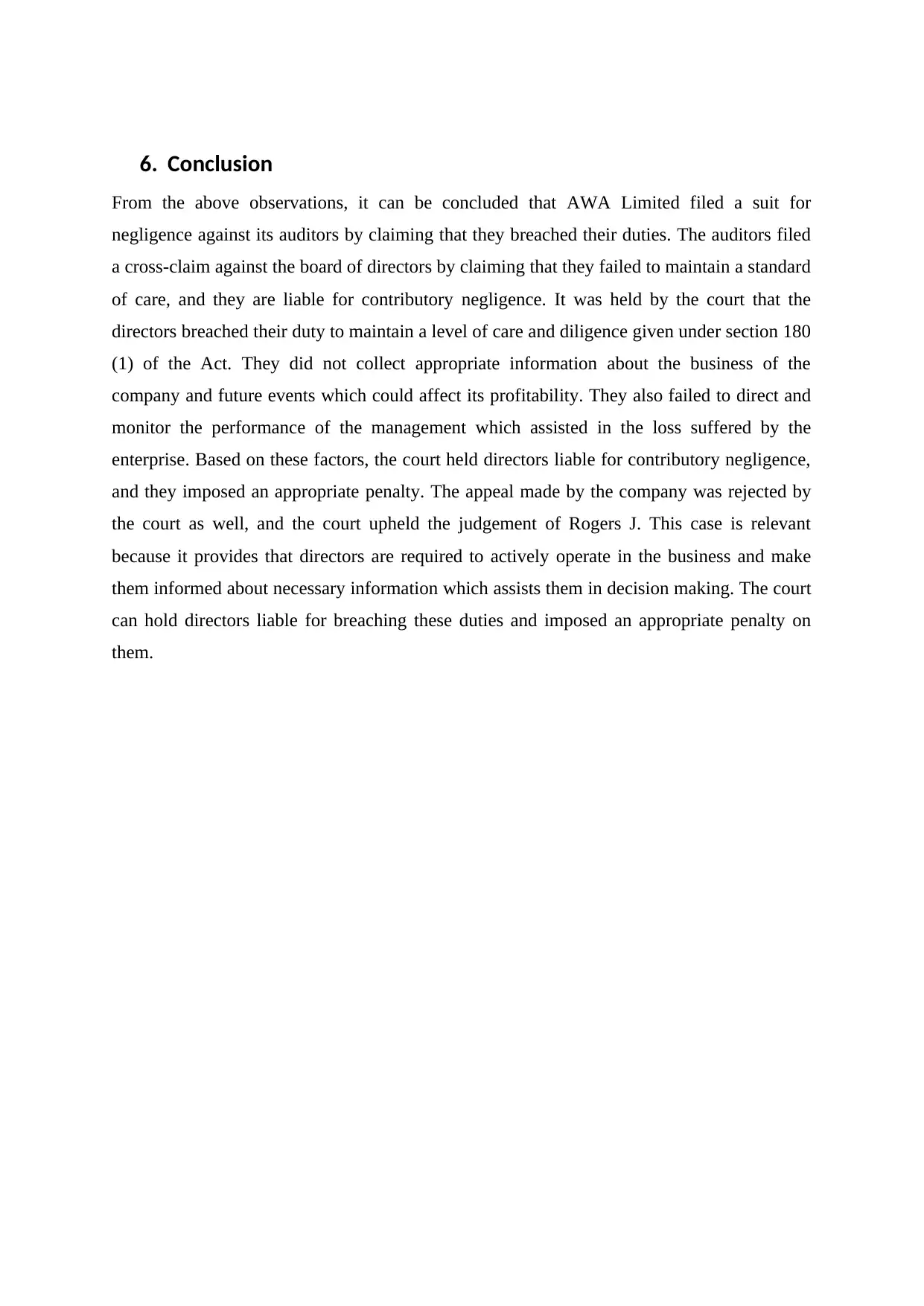
6. Conclusion
From the above observations, it can be concluded that AWA Limited filed a suit for
negligence against its auditors by claiming that they breached their duties. The auditors filed
a cross-claim against the board of directors by claiming that they failed to maintain a standard
of care, and they are liable for contributory negligence. It was held by the court that the
directors breached their duty to maintain a level of care and diligence given under section 180
(1) of the Act. They did not collect appropriate information about the business of the
company and future events which could affect its profitability. They also failed to direct and
monitor the performance of the management which assisted in the loss suffered by the
enterprise. Based on these factors, the court held directors liable for contributory negligence,
and they imposed an appropriate penalty. The appeal made by the company was rejected by
the court as well, and the court upheld the judgement of Rogers J. This case is relevant
because it provides that directors are required to actively operate in the business and make
them informed about necessary information which assists them in decision making. The court
can hold directors liable for breaching these duties and imposed an appropriate penalty on
them.
From the above observations, it can be concluded that AWA Limited filed a suit for
negligence against its auditors by claiming that they breached their duties. The auditors filed
a cross-claim against the board of directors by claiming that they failed to maintain a standard
of care, and they are liable for contributory negligence. It was held by the court that the
directors breached their duty to maintain a level of care and diligence given under section 180
(1) of the Act. They did not collect appropriate information about the business of the
company and future events which could affect its profitability. They also failed to direct and
monitor the performance of the management which assisted in the loss suffered by the
enterprise. Based on these factors, the court held directors liable for contributory negligence,
and they imposed an appropriate penalty. The appeal made by the company was rejected by
the court as well, and the court upheld the judgement of Rogers J. This case is relevant
because it provides that directors are required to actively operate in the business and make
them informed about necessary information which assists them in decision making. The court
can hold directors liable for breaching these duties and imposed an appropriate penalty on
them.
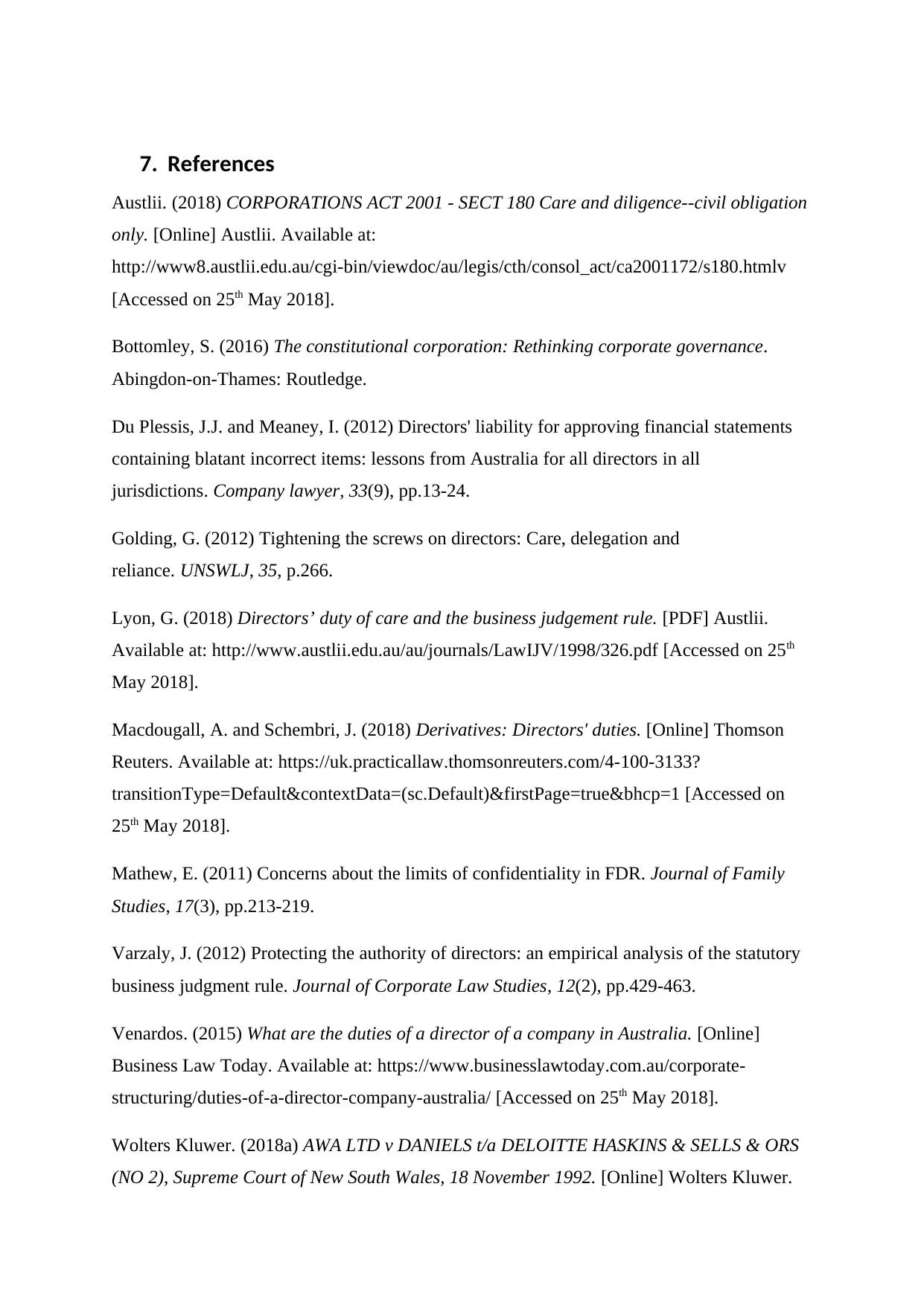
7. References
Austlii. (2018) CORPORATIONS ACT 2001 - SECT 180 Care and diligence--civil obligation
only. [Online] Austlii. Available at:
http://www8.austlii.edu.au/cgi-bin/viewdoc/au/legis/cth/consol_act/ca2001172/s180.htmlv
[Accessed on 25th May 2018].
Bottomley, S. (2016) The constitutional corporation: Rethinking corporate governance.
Abingdon-on-Thames: Routledge.
Du Plessis, J.J. and Meaney, I. (2012) Directors' liability for approving financial statements
containing blatant incorrect items: lessons from Australia for all directors in all
jurisdictions. Company lawyer, 33(9), pp.13-24.
Golding, G. (2012) Tightening the screws on directors: Care, delegation and
reliance. UNSWLJ, 35, p.266.
Lyon, G. (2018) Directors’ duty of care and the business judgement rule. [PDF] Austlii.
Available at: http://www.austlii.edu.au/au/journals/LawIJV/1998/326.pdf [Accessed on 25th
May 2018].
Macdougall, A. and Schembri, J. (2018) Derivatives: Directors' duties. [Online] Thomson
Reuters. Available at: https://uk.practicallaw.thomsonreuters.com/4-100-3133?
transitionType=Default&contextData=(sc.Default)&firstPage=true&bhcp=1 [Accessed on
25th May 2018].
Mathew, E. (2011) Concerns about the limits of confidentiality in FDR. Journal of Family
Studies, 17(3), pp.213-219.
Varzaly, J. (2012) Protecting the authority of directors: an empirical analysis of the statutory
business judgment rule. Journal of Corporate Law Studies, 12(2), pp.429-463.
Venardos. (2015) What are the duties of a director of a company in Australia. [Online]
Business Law Today. Available at: https://www.businesslawtoday.com.au/corporate-
structuring/duties-of-a-director-company-australia/ [Accessed on 25th May 2018].
Wolters Kluwer. (2018a) AWA LTD v DANIELS t/a DELOITTE HASKINS & SELLS & ORS
(NO 2), Supreme Court of New South Wales, 18 November 1992. [Online] Wolters Kluwer.
Austlii. (2018) CORPORATIONS ACT 2001 - SECT 180 Care and diligence--civil obligation
only. [Online] Austlii. Available at:
http://www8.austlii.edu.au/cgi-bin/viewdoc/au/legis/cth/consol_act/ca2001172/s180.htmlv
[Accessed on 25th May 2018].
Bottomley, S. (2016) The constitutional corporation: Rethinking corporate governance.
Abingdon-on-Thames: Routledge.
Du Plessis, J.J. and Meaney, I. (2012) Directors' liability for approving financial statements
containing blatant incorrect items: lessons from Australia for all directors in all
jurisdictions. Company lawyer, 33(9), pp.13-24.
Golding, G. (2012) Tightening the screws on directors: Care, delegation and
reliance. UNSWLJ, 35, p.266.
Lyon, G. (2018) Directors’ duty of care and the business judgement rule. [PDF] Austlii.
Available at: http://www.austlii.edu.au/au/journals/LawIJV/1998/326.pdf [Accessed on 25th
May 2018].
Macdougall, A. and Schembri, J. (2018) Derivatives: Directors' duties. [Online] Thomson
Reuters. Available at: https://uk.practicallaw.thomsonreuters.com/4-100-3133?
transitionType=Default&contextData=(sc.Default)&firstPage=true&bhcp=1 [Accessed on
25th May 2018].
Mathew, E. (2011) Concerns about the limits of confidentiality in FDR. Journal of Family
Studies, 17(3), pp.213-219.
Varzaly, J. (2012) Protecting the authority of directors: an empirical analysis of the statutory
business judgment rule. Journal of Corporate Law Studies, 12(2), pp.429-463.
Venardos. (2015) What are the duties of a director of a company in Australia. [Online]
Business Law Today. Available at: https://www.businesslawtoday.com.au/corporate-
structuring/duties-of-a-director-company-australia/ [Accessed on 25th May 2018].
Wolters Kluwer. (2018a) AWA LTD v DANIELS t/a DELOITTE HASKINS & SELLS & ORS
(NO 2), Supreme Court of New South Wales, 18 November 1992. [Online] Wolters Kluwer.
⊘ This is a preview!⊘
Do you want full access?
Subscribe today to unlock all pages.

Trusted by 1+ million students worldwide
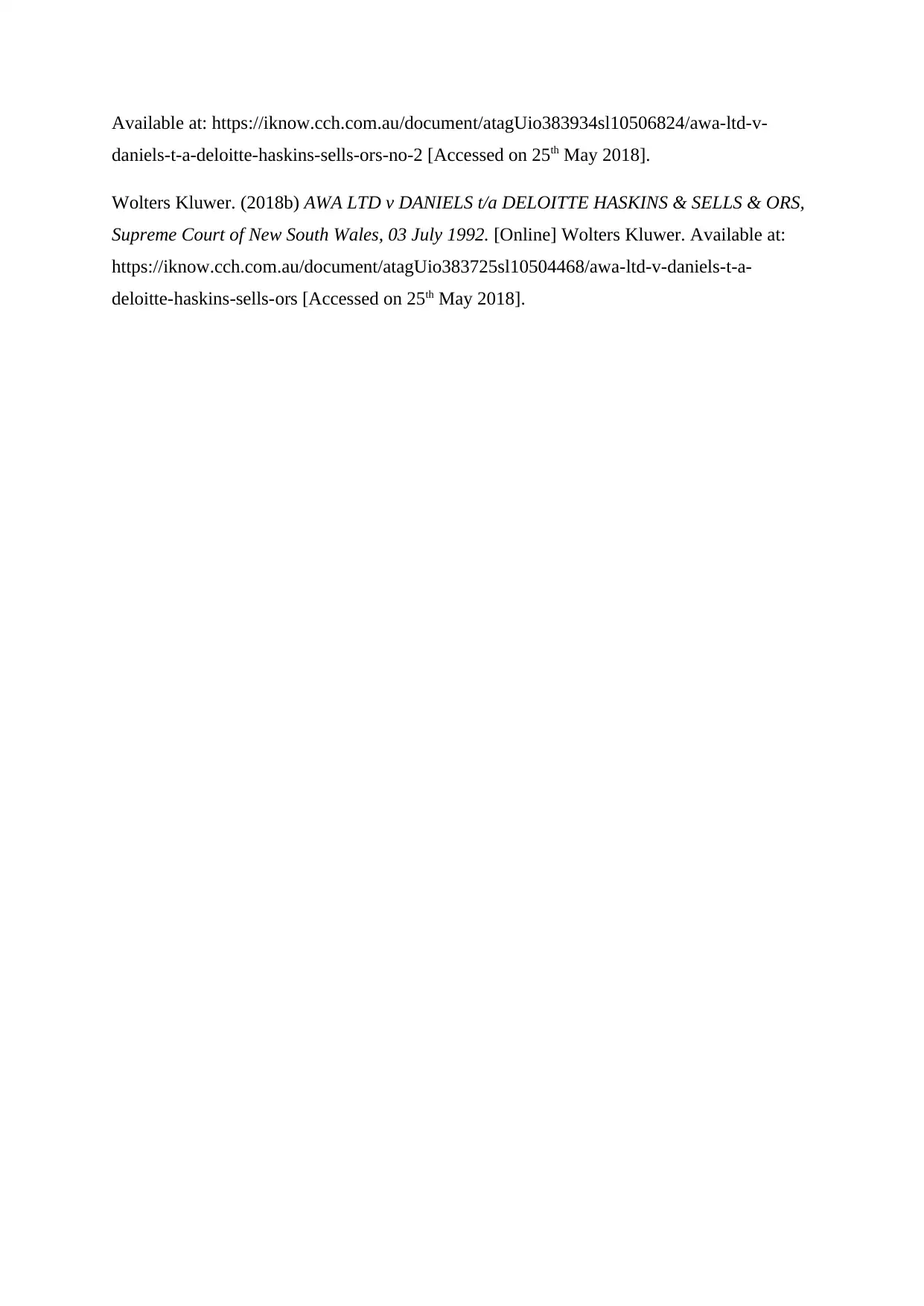
Available at: https://iknow.cch.com.au/document/atagUio383934sl10506824/awa-ltd-v-
daniels-t-a-deloitte-haskins-sells-ors-no-2 [Accessed on 25th May 2018].
Wolters Kluwer. (2018b) AWA LTD v DANIELS t/a DELOITTE HASKINS & SELLS & ORS,
Supreme Court of New South Wales, 03 July 1992. [Online] Wolters Kluwer. Available at:
https://iknow.cch.com.au/document/atagUio383725sl10504468/awa-ltd-v-daniels-t-a-
deloitte-haskins-sells-ors [Accessed on 25th May 2018].
daniels-t-a-deloitte-haskins-sells-ors-no-2 [Accessed on 25th May 2018].
Wolters Kluwer. (2018b) AWA LTD v DANIELS t/a DELOITTE HASKINS & SELLS & ORS,
Supreme Court of New South Wales, 03 July 1992. [Online] Wolters Kluwer. Available at:
https://iknow.cch.com.au/document/atagUio383725sl10504468/awa-ltd-v-daniels-t-a-
deloitte-haskins-sells-ors [Accessed on 25th May 2018].
1 out of 10
Related Documents
Your All-in-One AI-Powered Toolkit for Academic Success.
+13062052269
info@desklib.com
Available 24*7 on WhatsApp / Email
![[object Object]](/_next/static/media/star-bottom.7253800d.svg)
Unlock your academic potential
Copyright © 2020–2025 A2Z Services. All Rights Reserved. Developed and managed by ZUCOL.





